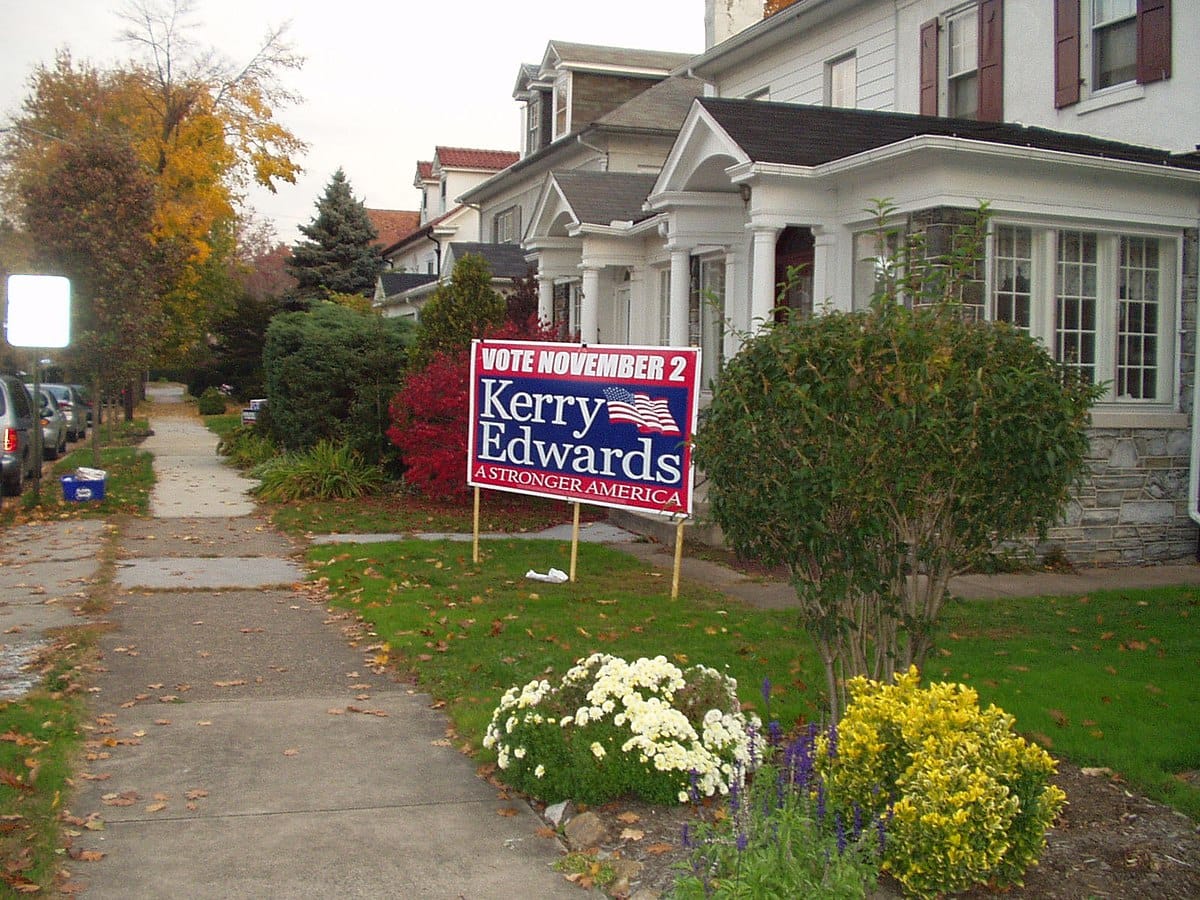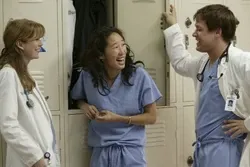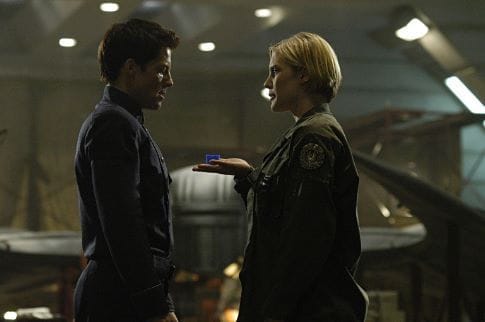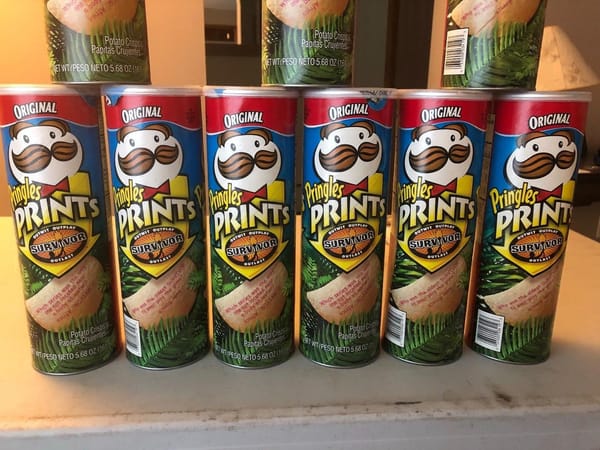Vote or Die: The Election Episodes of 2004

It was the early 2000s, and political consultants, community organizers, famous musicians, and aging boomers all had one complaint: young people weren’t voting. Youth voter turnout had reached historic lows in the 1996 and 2000 elections, and lots and lots of people were eager to turn that trend around. Rock the Vote launched a huge campaign: corporate partnerships, PSAs all over MTV, Spanish language outreach, deals with cell phone companies, web marketing, setting up shot in malls and on college campuses, a CNN special with Anderson Cooper, invoking the possibility of a draft, they pulled out all the stops. All kinds of celebrities were involved: Matchbox Twenty, The Chicks, and Bruce Springsteen, Samuel L. Jackson, Rachel Bilson. By the end of it all, the Rock the Vote was $700,000 in debt.
Of course some of that bled onto popular television shows of the day. I counted eight election episodes in 2004, all of them on shows targeted at families and young people. So how did American television look at the electoral process an young people’s role in it in 2004?
Joan of Arcadia, “The Election”
These election episodes are all pretty different. But they have one thing in common. The words “Bush” and “Kerry” are never mentioned. Writers wanted to address the election and get youth excited about voting, but they preferred to do so indirectly.
If your main character is in high school, there’s a pretty obvious way to do that: make an episode about a student council election. This was the natural route for Joan of Arcadia. This show is about Amber Tamblyn (in the titular role) talking to God. God sometimes appears as a the school stoner, or as a garbage collector, or as Mrs. Landingham from The West Wing. God would ask her to do something that would make the world better and help her “fulfill her true nature.” This usually involved joining some kind of extracurricular activity: cheerleading, AP Chemistry, yearbook, and so on. So in season two’s “The Election,” she has to get involved in the student council election.

Joan of Arcadia is a show about a girl who talks to God, but her God is a non-denominational one. The creator of the show even had rules to make sure of it. It’s one of the show’s greatest strengths. However, when the show takes a similar approach to politics, things go south. The show seems reluctant to take a stand on issues of any kind, even student council issues. All we know about Joan’s chosen candidate is that he has “plans.” There are no further details. Instead we get a parable about the dangers of mud-slinging. It ends with Joan and her friends nearly outing a closeted student, and it is impossible to take the storyline seriously. It makes it hard to like Joan or her friends, knowing that they seriously considered doing something so reprehensible, just to win a student council election for some twerp.
If the show has a political point, it’s you shouldn’t make people uncomfortable or alienated. We see that in the B-plot in which Joan’s mother battles the censorship of a taxidermied pet gerbil. The storyline is very concerned with the feelings of the censors. And when all that’s at stake is a gerbil, that’s fair. But the goal of censorship in schools in usually to make vulnerable people feel unwelcome.
If you refuse to say anything, all you end up doing is supporting the status quo. This episode proves that.
Veronica Mars, “Return of the Kane”
Veronica Mars also tried its hand at a student council plot. This one isn’t just an election episode, it actually aired on election day. If you look at the tv schedule from that night, you would assume that young people really didn’t care about politics. ABC, NBC, CBS, and FOX dedicated their precious primetime real estate to the election returns. This meant not airing popular programs like NCIS, George Lopez, and Law and Order: SVU. And the big four networks didn’t just do this out of civic duty. Election night got big, big ratings in 2004. It was about the bottom line.

But on youth-targeting networks the WB, UPN, and MTV, it was business as usual. Fans of Gilmore Girls, Veronica Mars, and Laguna Beach were all treated to brand new episodes. The bosses at those channels weren’t expecting their viewers to watch the returns. Laguna Beach even showed us what passed for civic engagement among its teen protagonists: a fashion show promoting their friend Trey’s trucker hats and also (somehow) the nonprofit Active Young America. According to Lauren Conrad, Trey “basically want to make young people feel like they can make a difference. And they can do things.” How a trucker hat fashion show might accomplish this is a mystery.
But Veronica Mars tried to make a more complex political statement for its audience of young people not tuning into the returns. The episode begins when Veronica’s former pep squad teammate decides to run for student council president on a platform of abolishing the “pirate points” system. Her platform is popular with burnouts, nerds, and art kids. The pirate points system is pretty much a way of letting the rich kids get special privileges like lunch delivery while telling everyone that they earned them fair and square. See, you can examine real world political issues in the context of a student council plot! It’s a potent metaphor, one that ties in nicely with the show’s focus on class.

Meanwhile, Veronica’s rich ex-boyfriend Duncan Kane’s dad is pushing him to run. He pulls out all the stops, even getting a celebrity endorsement from Logan’s movie star dad.
When the results have Duncan winning in a landslide, Veronica knows something is wrong. She has to push past a complacent administrator (Jane Lynch!), but she discovers that phony ballot instructions were given to art, auto shop, and other classes that were expected to be pro-Wanda. Those kids thought they were voting for Wanda, but their votes were counted for Duncan. It’s a clever twist that mirrors real-life dirty tactics (e.g. making sure the wording for a ballot proposition is confusing).
A runoff between Wanda and Duncan ensues, and Wanda gets accused of being a narc. Veronica suspects dirty tactics from the rich kids. But after talking to Weevil, the Latine leader of a local biker gang whose grandmother cleans the houses of Neptune’s rich and famous, she discovers that to the true outsiders, Wanda is a narc: she informed on Weevil’s cousin Felix.
And before Veronica has time to process all this, it’s time to vote! She remembers how Duncan was sometimes benevolent towards the outsiders over the objections of dickish Dick Casablancas (Ryan Hansen, making his series debut). So she votes for Duncan, and tells off Wanda, who just wanted her record expunged. Duncan keeps the pirate points, but allows people to earn them with good grades, vocational work, art, and non-rich kid activities. So I guess the message is stick to the status quo, and the poor little rich boy might surprise you.
And just like in Joan of Arcadia, this subtext is mirrored in the b-plot, in which a storyline about Logan starting a fight club and exploiting Neptune’s unhoused population for his own entertainment turns into a storyline about Logan and his abusive dad by the end of the episode.
7th Heaven, “Vote”
Earlier, I discussed how Joan of Arcadia often went out of its way to avoid political statements. That’s not entirely true. For one, Joan of Arcadia occasionally showed some real insight into issues like police brutality and local political corruption, especially early on in its run. But it also didn’t matter what it did or how neutral it was. Joan of Arcadia was about a girl talking to God. It was perceived as a conservative show. In the aftermath of the 2004 election, in which family values conservatives had demonstrated the extent of their political power, there was some hand-wringing in the entertainment press about whether Hollywood should start catering more to Red states and family values. But the rebuttal to that was easy. Joan of Arcadia wssn’t a hit. But Nip/Tuck, and The OC, and The Sopranos, and Desperate Housewives, and a dozen other shows featuring sex or violence or scandal or foul language or all of the above? Those were hits.

Of course, those arguments were ignoring the biggest family values show on broadcast TV. 7th Heaven was in its 9th season, and it was strong as ever, averaging over 5 million viewers an episode. Rock the Vote was primarily backed by democrats, and today the youth vote is firmly left-wing. But the youth vote only really started trending left in the Obama era. In 2000, Bush and Gore were actually tied among voters 18-24. Nader got 5% of the vote, so the youth vote was still trending left. But you weren’t seeing the 60-40 splits you’d see in most subsequent elections. The political allegiances of millennials were fairly uncertain. Of course the biggest Conservative show on the air did its very own election episode.
All these episodes want to engage youth in politics. But their expectations are so low. They rarely ask for anything beyond the bare minimum: voting, and only presidential races. And they act like even that is this huge lift! This is never more obvious than in the 7th Heaven episode “Vote.” We can tell that young people don’t care about politics because anytime an adult starts trying to talk politics with one of our pastor hero’s seven kids or their various love interests, the dialogue will be overlaid with “blah blah blah blahs.” I’m not joking!
Of course, this only applies to the central family, led by the great noble reverend father. Elsewhere, the child of an American soldier deployed to Iraq, two different Iraqi kids (one pro-war and one anti-war), a Native American kid, and a second generation Italian American kid all burst into a spontaneous debate about the Iraq war in a local schoolyard. Opinions include “what about Sudan” and “my family would still be living under Mussolini if America hadn’t gone to war.” It’s nuts.
This makes one of the younger kids on the show feel uneducated, and prompts a lot of awkward and heavy handed discussion about who in the family is registered to vote and who voted in the last election and who plans to vote in this one. Some people secretly aren’t registered, and maybe the reverend’s wife secretly voted for Gore? It’s all treated so seriously that it ascends to camp. The ending of the episode includes a big montage in which a bunch of children (including many of the token minorities from that absurd schoolyard fight) address the camera and say “vote for me,” vote for the children. I mean, I’m on board with that in theory.
The parents look at political ads on tv, and this time it’s they hear the “blah blah blahs.” That kind of gives the game away. The show doesn’t care very much about the political process. It just wants the world to leave them alone so everything can stay the same. The moment embodies the certain type of pseudo-apolotical religious conservatism that defines the show. This point of view pretends to be tolerant, but it advocates for the oppressive status quo. It makes me angry. Knowing that the supposed moral pillar at the center of all is a child molester certainly doesn’t help.
Gilmore Girls “Tippecanoe and Taylor Too”
Joan of Arcadia tried to be apolitical and failed. 7th Heaven pretended to be apolitical. But one show did succeed in making an apolitical election episode, and that was Gilmore Girls.
Melissa McCarthy’s husband is running for town selectman (apparently that’s what supervisors are called in New England). It’s mostly an excuse to throw a big big party where Lane and her band can play and Rory and Dean can have a fight. The storyline is without any trenchant political insights and that’s probably for the best (please don’t make me listen to Stars Hollow residents discussing the Iraq war or tax cuts for Richard and Emily and their ilk. No thank you!).
Anyway, Mr. Melissa McCarthy wins in a landslide. The only votes his opponent receives are because Lorelai felt bad for him and begged random passers by to take pity on him. When he’s about to win, he gives a speech about how he likes his life and doesn’t really want the responsibility, but that just convinces the crowd he’s the perfect politician after all. This episode has avoided talking about issues of any kind, and represented politics as merely a small town popularity contest. But sometimes that’s what politics is. By the end of the episode he’s helplessly listening to someone harangue him about the hedge height regulations. And that’s a pretty good representation of what it’s like to be a small-town politician. It’s exactly the level of insight you want from this show.
South Park, “Douche and Turd”
At the beginning of this post, I said that no 2004 election episodes featured the name “Bush” or “Kerry.” I didn’t say that no one talked about them. South Park talks about them. But they’re represented by a Giant Douche and a Turd Sandwich, respectively.
So we arrive at South Park‘s “Douche and Turd,” easily the best known and most influential of all 2004’s election episodes, and possibly the most famous election-themed tv episode of all time.

I should state upfront that this was the first episode of South Park I ever watched. Slate describes this episode as the ultimate gateway to the show, the episode that will tell you if you’re a South Park person or not. I’ve seen the episode now. I’m not a South Park person.
I find everything about the show unpleasant. The smugness, the shoddy animation, the bland voice acting. I didn’t laugh once. The show reminds me, viscerally, of every smug nerd I hated in high school (My friend’s mom called them “science jocks”). The show’s contempt for anyone who hasn’t bought into its everyone sucks nothing matters worldview is palpable. There is truly nothing worse than someone who thinks they have all the answers, especially when they’re a rich white guy.
But I do think some of the satire does hit home, especially in the political landscape of 2004. Remember that crazy campaign to get out the vote that I described at the top of the post? This episode is firmly focused on that campaign. It’s especially focused on a specific get out the vote campaign: P. Diddy’s “vote or die” campaign. Today, P. Diddy is disgraced, but in 2004 he was a mega-platinum success and at least semi-respectable (he starred opposite Audra McDonald in A Raisin in the Sun on Broadway!). The political establishment welcomed his support. On TV, MTV and other youth-targeting channels were filled with “Vote or Die” adds, Tracee Ellis Ross wore a “Vote or Die” t-shirt on Girlfriends. It was a thing!

But “Vote or Die” and other efforts to get out the youth vote ultimately feel kind of hollow, even if they maybe kind of worked. They treat getting young people to vote as this huge hurdle. It’s just “vote.” There’s no focus on downballot races, on voting when it’s not a presidential year, on additional activism, or on any issues at all. Just vote. Just…because. Because it will make us feel better. Because me telling you to do this makes me look good.
South Park brutally skewers the shallowness of this approach. The students are voting for the school mascot. It’s a race between a Giant Douche and a Turd Sandwich. Protagonist Stan doesn’t want to vote, and this makes everyone apoplectic. It makes his classmates annoyed. You should vote, because you’re going to vote for our guy, right? The adults feel uncomfortable. Vote because then we can tell ourselves everything is fair and OK! Diddy shows up (turns out he was serious about the whole vote or die thing) and there’s a pretty funny original song. Everyone tells him he has to vote and make them feel better. When he refuses he is banished to live with horse-fucking PETA members because he’s making them feel bad. He has a big epiphany that he doesn’t like either of the candidates but he never will like any of the candidates, so he should let his vote be counted. He votes, and finds that his vote didn’t count, his candidate was way down in the count. And nobody wants anything to change anyway. But he should be happy he voted. Just…because.
The hollow reverence for voting present in our culture is ripe for satire, and South Park took full advantage. But I think they miss something in the process. Our society’s reverence for the act of voting may be silly and hollow, but we need it! This shallow rhetoric is what makes it socially unacceptable to tamper with the electoral process. Society is built on a series of fig leaves, and the “every vote matters” fig leaf protects people’s right to vote. Ideally, that fig leaf would be backed up by robust legislation but the fig leaf still has real power on its own. And in today’s dangerous electoral climate, with our democracy teetering on the brink, I will take that fig leaf! We need to use every tool at our disposal.
South Park is really obsessed with the idea that both candidates are equally bad, and so voting is kind of pointless, a point of view that is in vogue once again this election cycle. And this is hardly an original observation, but it’s easy to hold that opinion when you’re a straight white man. In 2004, LGBTQ people were facing reactionary anti-Gay marriage ballot measures, Arab-Americans were faced with a candidate who made fanning the flames of Islamophobia a core part of his campaign strategy, and anyone with a uterus had plenty of reason to worry about future supreme court appointments. In more recent elections, the stakes have been even higher for vulnerable people everywhere. Try telling them all that’s at stake is a battle between a giant douche and a turd sandwich.
So yeah. I don’t find South Park‘s satire that compelling at the end of the day.
Jack and Bobby, “Election Night”
But then I watch something like the Jack and Bobby episode “Election Night,” and I think that maybe South Park had a point.
Jack and Bobby is a show about the future president of the United States. Logan Lerman grows up to become a moderate Republican who runs as an independent and wins, fulfilling the dreams of centrists everywhere. But now, he’s in middle school, dealing with his popular older brother and domineering liberal mom Grace (Christine Lahti).
As a political show, Jack and Bobby had to do an election episode. And it brought something new to the sungrenre. They shot three endings: one where Bush won, one where he lost, and one where everyone was waiting for a recount. This would place Bobby’s story firmly in the current historical moment.
One would think that such an episode would show Bobby engaging with the political process or the issues of the day. But he’s mostly sad because he just got dumped. Meanwhile, his older brother’s girlfriend wants to use the distraction of election day (her Reverend father is driving seniors to the polls) as an opportunity to lose her virginity. Clearly, young people don’t care about politics.

That’s certainly what Grace thinks. No one wanted to come to her election night party. She got her TA Bradley Cooper to recruit attendees. When a colleague suggests that the girls who signed up did so for prurient and not civic reasons, she yells at Bradley Cooper because his generation is so apathetic, boo-hoo, and he tells her off for being an annoying boomer, in a speech that would sound right at home on tv today.1 Later, she leaves to smoke pot with him, and they kiss, and the show lets us know that this is Very Wrong because as soon as they kiss her poor future president Bobby has an asthma attack.2
Throughout, the kids pretty much ignore the election, and the show seems to admit that young people don’t care about politics. But there’s another element to the show: talking head segments from a future documentary about Bobby’s presidency. In this episode, those segments reveal that he his victory was very narrow. It all came down to his home state, Missouri, which he won by just a handful of votes. As college student Scott Foley tells us, what made the difference was a bunch of Missouri natives at the University of Illinois taking a bus home to vote. So Scott Foley the talking head tells us, assuring all that your vote does matter, and young people do vote, and you can make a difference. As long as you’re from the right state. Is that the only way that young people can make change? It’s meant to be an inspiring story about how every vote matters, but all I could see is a story about a stupid broken system.
American Dreams, “Surround Me” (and also “So Long, Farewell”)
On Jack and Bobby, Grace claims that everything was better and that everyone cared more about politics back in the ’60s and ’70s. One show in 2004 actually did give us a peak at the electoral process in the 1960s. That show was American Dreams, an NBC family drama set in Philadelphia. American Dreams‘ election episode takes place in 1965, which makes it unique. Not just because it’s focusing on a past election, but because it’s focusing not on a presidential election but rather on patriarch Jack Pryor’s race for city council.
Democrat Jack is facing dirty tactics from his Republican opponent, so he’ll need the Black vote to secure victory. He turns to his business partner Henry Walker for help. They organize buses to take Black voters to the polls, but the buses are sabotaged. So they walk, and they vote, and Jack wins. It’s rare to see television talk so frankly about voter suppression. But in order to understand the importance and power of voting, one must reckon with the fact that racist voter suppression has been part of every single American election. This wasn’t some big secret back in 2004. Tina Fey joked on Weekend Update that “Election offices across Florida opened last Monday to give black voters the option of being turned away early” just two weeks before the 2004 election.
But what really elevates American Dreams‘ the story of the election continues. It isn’t just an election episode, it’s a whole mini-arc. In the next episode, “So Long, Farewell,” Jack is in the city council, and Henry and his friends are eager for him to fulfill his promises: they want a Black person on the police commission. Jack insists that he doesn’t have the clout, it isn’t the right time. If he does this, he’ll be branded as the “Black issues” city councilman, and he won’t get anything done. He knows he owes his seat to Black voters and their sacrifice, but sorry, they’ll have to wait. Henry is reluctant to contradict his friend and jeopardize their relationship and shared business. But his friends aren’t so patient. They’ve done this song and dance before, and they know how it ends. So they don’t give Jack the option of ignoring them. They attend the city council en masse, and ask him questions. They elected him, he’ll be branded with that whether he likes it or not.
We see variations of this dynamic play out every election cycle, and it was truly satisfying to see it play out on television, and to see Black voters push back against the complacency of a white politician. But more than that, it was gratifying to see a show acknowledge that voting can only do so much by itself. You have to go the extra mile.
We see all kinds of characters go that extra mile. Heroine Meg (Brittany Snow) plans to use her Catholic school production of Henry V as a coded Vietnam War protest, in honor of her brother, who is currently fighting there. This storyline had special resonance in 2004, wit the war in Iraq ongoing. The war quieted down before the election, but it would only become more bloody, more fruitless, more cruel, and more controversial in the coming years, inspiring lots of Vietnam comparisons. Newscasts from this period are filled with the names of dead soldiers. Lots of Americans were in Meg’s position in 2004.
After the principal discovers her plans, he tells her to leave the Vietnam stuff out, and fires the nun who sanctioned her plans. But Meg and her friends go ahead with the protest anyway, making it even more explicit. It’s genuinely inspiring stuff. After a lot of episodes full of mealy mouthed politics and writers hedging their bets, it’s thrilling to see some real action, and to see some writers really say someting.
One on One, “Rock the Vote”
American Dreams showed America how you could do more than vote back in the swinging ’60s. But one show showed young people what real activism could look like in the present day.
One on One was a Black UPN sitcom about Flex (Flex Alexander) raising his daughter Breanna (Kyla Pratt) by himself after her mother moves away for work. The sitcom had grown into a solid hit for UPN, and by 2004 it was one of the top three shows among African Americans.
One on One was the only network sitcom to do an election episode. They managed to make an episode that’s forthright in its politics, but never feels like a very special episode. It’s not didactic, it’s not a polemic. There are lots of jokes. There’s a silly sub-plot about the then rising problem of identity theft. It feels the other episodes of the show, like a charming and funny family comedy with lots of heart.

But there is no mealy-mouthed both sides nonsense here. The show has a clear political message, and it makes a special effort to communicate it to its audience of Black families. The episode opens with her Breanna asking her father an important question as she prepares to vote for the first time: what outfit should she wear? But they don’t treat this as evidence that she’s superficial. The show understands that you can care about your outfit AND the political process at the same time. And Flex wins major dad points in my book when he takes the outfit dilemma seriously.
Flex and Breanna are especially engaged with this election since their cousin is running for mayor. But when Breanna realizes her cousin is going to cut school arts funding, she attends a protest, ends up on tv, and makes the whole family uncomfortable, which is always good news in a sitcom. While he’s discussing the merits of his cousin, Flexter points out that once the new stadium was built, he never took his family to games, he just took his corporate buddies. This is a joke about how self-absorbed Flex is, but there is of course a real political argument hidden in that complaint.
Of all the episodes that I watched, this is the one that I could actually imagine making young people excited about voting and the political process. Hell, it energized me! It doesn’t preach, it focuses on an issue that’s relevant to young people, but it also has a very clear point of view. And it shows teens the value of voting and of political protest, and it shows young people developing their own political opinions and taking action. And it shows that protest and politics can be fun! You can have fun with your friends, end up on tv, and piss off your parents. One on One knew they had a platform (one again, they were one of the top three shows among African Americans) and they used it to really say something. That shouldn’t impress me so much, but after watching all these episodes, an episode that doesn’t hedge its bets and depicts real political activism in the present day feels like a miracle.
The episode ends with Flex watching the returns with Breanna and her friends. Right as they announce the result, it cuts to a black screen with the words “Vote or Die!” I had no idea that the “vote or die” campaign was a Diddy project when I watched this, so I just thought that I was seeing an especially stirring political message. Of course, I was seeing some celebrity activism from a man currently on trial for sex trafficking.3 But you know what? I was seeing an urgent and still relevant political message too. Diddy may be responsible for untold horrors, but “Vote or Die” is a good slogan. People made fun of its hyperbole at the time.4 But it was it so hyperbolic? A second Bush term meant more climate change denial, more war in Iraq, more restrictions on abortion access, and the many failures of hurricane Katrina. A lot of people died because of those decisions and countless others made by Bush and other people empowered by the 2004 election. And now we’re entering an election where “vote or die” feels pretty damn literal for millions of people.
That’s all, folks
It’s easy to criticize Rock the Vote and all these election episodes on shows for kids. But the thing about the 2004 campaign to boost voter turnout among young people is that it worked. Youth turnout increased by 10 percentage points.
People dismissed this at the time. Overall voter turnout was up, so the youth vote actually made up a smaller percentage of the electorate. But youth voter turnout increased again in 2008. It decreased in 2012 and 2016, but it never returned to the low point of 1996 and 2000, and youth turnout in 2020 was the highest it had been since the 70s. 2004 really did turn the tide (though the midterm election data on youth participation suggests that we still have a lot of work to do).
Who knows, maybe all these episodes on shows popular with teens really moved the needle, even the ones that barely said anything at all. But this was the last time that television shows made a really big push in the lead up to election day. South Park has continued to do special episodes for every presidential election. And other shows like The West Wing, Scandal, Battlestar Galactica, and The Wire did election episodes, but mostly on their own schedule, when the plot demanded it. There are many possible reasons for this. Television became more serialized. Perhaps with with the rise of the internet and social media, special interest groups lost faith in the ability of a single television show to move the needle, and there was less of a push for networks and creators to make these episodes. Perhaps in the age of a 24-hour news cycle, confining politics to a very special election-themed episode just feels silly. And perhaps even the mealy mothed political gestures in so many of these episodes seem dangerous to the powers that be in the age of corporate consolidation and increased polarization.
Whatever the case may be, the election episodes of 2004 represent a unique moment in time, when television tried to tell a new generation (my generation) why politics was important.
I’ve been writing this blog for over a month now, and it’s taught me that the history of television, like all history, is both better and worse than you thought. Most of these episodes, many of them from shows I really like, exemplify all the problems with the political discourse of the Bush era and still haunt us today: both-sidesism, the performance of neutrality, smug nihilism, and the belief in the satus quo. But a UPN sitcom and a soon-to-be-cancelled family drama, two shows that I’d never even heard of before, showed me a different way and left me genuinely inspired. And I think that’s kind of beautiful.
- My favorite Grace comment comes when she muses that she might be fine with Bush winning because Hilary can win in four years. Grace is the most Hilary voter to ever Hilary. ↩︎
- Jack and Bobby is so eager to appear unbiased that it often ends up outright Conservative. This is one of those moments. 1 ↩︎
- (and the One on One‘s connection to Diddy goes further than this episode, the season premiere involved Breanna seeing Diddy in A Raisin in the Sun on Broadway. ↩︎
- And not just South Park. A couple days after the election, Conan joked that ↩︎





